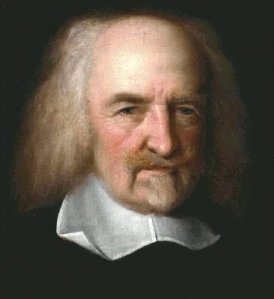 Thomas Hobbes (1588 – 1679) was an English philosopher who wrote on a host of topics from morality to geometry to theology. However, he is best known for his work on political philosophy. His work was novel and highly inventive, and he is credited as the outliner of many of the fundamental principles of European liberal politics.
Thomas Hobbes (1588 – 1679) was an English philosopher who wrote on a host of topics from morality to geometry to theology. However, he is best known for his work on political philosophy. His work was novel and highly inventive, and he is credited as the outliner of many of the fundamental principles of European liberal politics.
Like many modern thinkers, Hobbes thought bears striking similarities to a classical counterpart – in this case Epicurus. Like Epicurus (who was a classical atomist), Hobbes also upholds the mechanistic account of man i.e. that human beings are simply natureless and formless matter and motion.
Hobbes’ great thesis is in answer to the distinctly Hellenistic question: if man is atoms and void, then how should he go about living? Like Epicurus, Hobbes develops a theory of the “social contract”.
Hobbes argued that when men neglected the social contract they lived in a “state of nature”. In this state each man only looks out for himself and social interaction becomes impossible. Ultimately, this kind of highly individualistic behavior ends in chaos and anarchy.
Hobbes’ social contract consists of individuals coming together while ceding some of their rights in order to gain tangible benefits. The social contract gives birth to the state as a kind of regulatory body who governs the various tenets of the contract. Hobbes thought is innovative in that he includes the state in the social contract rather than above it – his idea is that the state may govern legitimately only with the consent of the people.
Along with Epicurus, Hobbes’ conception of the social contract is liberal. People are free to do whatever they wish so long as their activity is not forbidden by the social contract.

Posted by John Locke: a new social contract | thelycaeum on 09/16/2013 at 8:19 pm
[…] stated previously, Thomas Hobbes is generally considered the father of modern social contract theory. However, the idea of the social contract received arguably its definitive expression via another […]
Posted by Rosseau: a radical reinterpretation of the state of nature | thelycaeum on 03/06/2014 at 9:01 pm
[…] thinkers that precede Rousseau regarding the state of nature: Hobbes and Locke. For Hobbes, the state of nature is men aside from civil society, a state ruled entirely by the self-interest of …. According to Locke, the state of nature is articulated through the natural and alienable rights of […]
Posted by Schopenhaur: the world as will | thelycaeum on 05/30/2014 at 9:35 pm
[…] notion that man as an individual or collectively as a society could reason what is good for him. Like Hobbes, Schopenhauer believed that man was motivated only by his most base and crude desires. Per […]
Posted by Jeremy Bentham: utilitarianism, humanism and hedonism | thelycaeum on 06/07/2014 at 3:03 pm
[…] in which the individual must be allowed to pursue their own well-being. But at best, this is a social contract that is upheld only by the positive law of the government as opposed to anything in the nature of […]